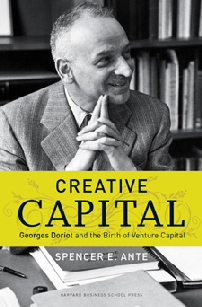Yesterday, BusinessWeek published my profile/Q&A with venture capitalist Michael Moritz. The news cycle is insane these days, so I am reposting the top of the piece here as well as a link to the rest of the interview. Plus, Moritz doesn’t give many interviews, so it’s worth spreading the thoughts of perhaps Silicon Valley’s most successful investor.
Michael Moritz: Lessons from a Long-Ball Hitter
The journalist-turned-venture capitalist was early to ring the alarm bells about the weakening economy, but he remains optimistic
In 1984 a young British journalist named Michael Moritz wrote a short piece in Time magazine about the legendary venture capitalist Arthur Rock with the title “The Best Long-Ball Hitter Around.”” Today, the 54-year-old Moritz is the guy who swats investing home runs as a partner with the Silicon Valley venture capital firm Sequoia Capital. Moritz joined the firm in 1986 after leaving Time (TWX) and writing a book about Apple (AAPL), The Little Kingdom: the Private Story of Apple Computer.
The deal that made Moritz’s reputation as one of the top venture capitalists in the business came in 1999. That year he pushed Sequoia to make a $25 million co-investment with Kleiner Perkins in a little search company called Google (GOOG). When Google went public five years later in 2004, Sequoia’s $12.5 million investment was worth just over $2 billion—160 times its original bet. Before then, Moritz had put himself on the map with investments in Yahoo (YHOO), eToys, and Flextronics (FLEX), among other successful Web startups. Since the Google deal, Moritz has maintained his slugging percentage, scoring another big win with his investment in PayPal, which eBay (EBAY) bought in 2002 for $1.5 billion.
Moritz typically shuns publicity. But in early February I met him at his office on Sand Hill Road, in the last office park on the lane that serves as home to the kingpins of venture capital. A secretary ushered me into a conference room, but when Moritz showed up he invited me to sit in his office.
Efficiency, Even While Eating
Moritz wore the standard business casual uniform of the Valley: striped dress shirt and slacks, with a sport coat hanging on the wall. He has a small and simple office, with a desk and a table with a few chairs, and a window overlooking the woods. An old and weathered notebook case rested on the table. On his desk sat an Apple (AAPL) iMac computer, an Apple laptop, and a BlackBerry (RIMM), all plugged into the wall. Having visited China seven times last year, Moritz needs to recharge his batteries when he returns to the Valley.
When reporters interview people over lunch, they often can’t find enough time to eat. But Moritz was extremely efficient, downing a fruit plate and Cobb salad, even while picking out the eggs and bacon to set them to the side of the plate. As we discussed the history of Sequoia Capital, the state of Silicon Valley, and the future of investing, Moritz would stab a fork into a group of berries, stick them into his mouth, and gaze off into the distance, before offering up some quip or bit of insight.
Moritz’s presence belies his firm’s reputation for toughness. While Sequoia has made many bold bets over its 36-year history, it has also gained a reputation in some quarters for walking away from portfolio companies that fail to perform. As one head of an investment firm that invests in venture firms put it: “They take the portfolio out back and shoot it. They stop funding companies quickly if they are not working.” Moritz calls the criticism “unfounded” and says there are several instances when Sequoia and its startups “soldiered forward together when times were very bleak.”
Pivotal PowerPoint Presentation
Sequoia’s hard-nosed nature was accidentally put on display last year when Moritz’s firm put together a PowerPoint presentation detailing the coming economic downturn in stark terms. The 56-slide presentation advised companies to cut costs and become cash-flow-positive more quickly in order to avoid falling into a death spiral. Although the presentation leaked out on the Web, Moritz swears the leak was not intentional. “A couple of the CEOs asked us to send them the presentation to help them convince their management teams that this was the deal,” says Moritz. “It was not a cynical attempt to spread the Sequoia name.”
Even though Sequoia was early to ring the alarm bells about the weakening economy, Moritz says he remains optimistic. He is particularly excited about two recent investments he led. One was in digital camcorder maker Pure Digital Technologies, which he claims is the world’s leading maker of digital camcorders, having shipped 1.5 million units last year. He is also bullish about another investment in Green Dot, which he says is a leader in prepaid credit cards. And contrary to word on the street, Moritz says Sequoia still invests in young seed-stage companies from time to time.
The day I met him, in fact, he said he was talking to a 20-year-old about investing $500,000 in an embryonic idea. (He wouldn’t discuss the venture in detail.) “It’s as easy for me to be excited today by the unknown 23-year-olds as I was in the past,” he says. “Those sorts of encounters lift your spirits in imagining what is possible.”
Here’s an edited version of my interview with Moritz:
Can great companies be built in bad times?
Some of that is true. In bitter and cold times only the brave are going to venture out into the cold and the lily-livered posers are going to stay tucked into their bed clothes. It makes life easier for us. The people we are meeting are the genuine article as opposed to the pretenders. The only people who venture out are on a mission, which is what you need.
Click here to read the rest of the interview.
